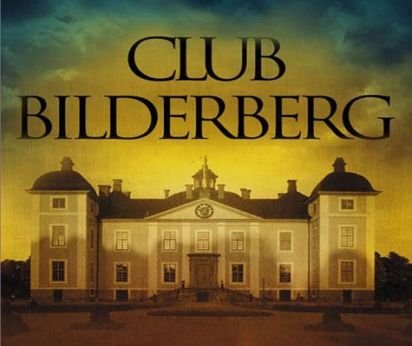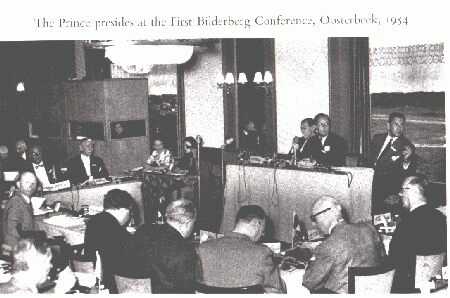Introducing the Bilderberg Club

Last year, when I’d asked Nurul Kabir if he knew that America’s central bank, the Federal Reserve, ?was privately-owned (New Age, November 14, 2011),? I’d slipped in a mention of the Bilderberg Club as well. Have you heard of it? No, he replied.
The same reply from another journalist friend, who works for one of the largest-circulation Bangla newspapers, when I met him recently. ‘The Bilderberg Club, does that ring a bell?’ ‘Uh-uh,’ accompanied by a puzzled look on his face.
Not surprising given that the Club, also known as the Bilderberg Group, has been excessively secretive about its existence. In the more than fifty years of their meetings, writes investigative journalist Daniel Estulin — who has relentlessly hunted their secret meeting places for nearly the last two decades, has gained access to insider information of what goes on ‘behind closed doors,’ has photographed those who have attended their annual conferences, and divulged it all in his book The True Story of the Bilderberg Club (2007) — the ‘press has never been allowed to attend, no statements have ever been released on the attendees’ conclusions, nor has any agenda for a Bilderberg meeting been made public.’
Estulin writes in the introduction to the opening paragraph of his book, ‘In 1954, the most powerful men in the world met for the first time under the auspices of the Dutch royal crown and the Rockefeller family at the luxurious Hotel Bilderberg in the small Dutch town of Oosterbeck. For an entire weekend, they debated the future of the world. When it was over, they decided to meet once every year to exchange ideas and analyze international affairs. They named themselves the Bilderberg Group. Since then, they have gathered yearly in a luxurious hotel somewhere in the world to try to decide the future of humanity. Among the select members of this club are Bill Clinton, Paul Wolfowitz, Henry Kissinger, David Rockefeller, Zbigniew Brzezinski, Tony Blair and many other heads of government, businessmen, politicians, bankers and journalists from all over the world.’

But investigations carried out by the alternative media ? accompanied by a rising distrust in mainstream western media ? fuelled by activist protests, and by anti-Bilderberg politicians, has increased public curiosity and alarm in recent years. Decades of secrecy have given way. The lid secured by the ‘media blackout’ has popped open.
Last year the Bilderberg finally admitted its existence for the first time. An official website was created, but although the information offered is paltry (mostly on membership, its Steering Committee, and its conference), this too, would not have been forthcoming, says Andrew Gavin Marshall, if alternative media coverage and protests had not occurred (RT interview, June 9, 2011).
One such protest was recently voiced by Gerald Batten, member of the European Parliament, at Strasbourg on September 12, ‘The Commission have recently replied to my written question confirming that commissioners [Joaquin] Almunia [vice-president of the European Commission] and [Neelie] Kroes [vice-president of the European Commission] attended the Bilderberg meeting in St Moritz in June [2011]. The Commission cannot tell me the details of what was discussed but they assure me that the Bilderberg meetings do not take decisions. If Bilderberg meetings are just talking shops why do the most important and powerful figures from around the world including George Osborne the Chancellor of the Exchequer bother to attend? And what other summit of world leaders in politics, finance and business would go completely unreported in the mainstream media such as the BBC? It is important not to reach the conclusion that the non-reporting of these events is anything other than a conspiracy between the organisers and the media. It merely confirms the belief of many that the hidden agenda and purpose of the Bilderberg group is to bring about undemocratic world government. Its a disgrace that the European Commission is colluding in that.’ (Vigilant Citizen, September 21, 2011).
The online BBC news magazine did feature an article, but it is regarded by Bilderberg watchers as being a ‘disinformation’ piece. Blogger Vigilant Citizen points out, in the BBC’s article titled ‘Bilderberg mystery: Why do people believe in cabals?’ (June 8, 2011) the labels ‘conspiracy theorist’ and ‘anti-semitism’ are repeatedly used. Those who question Bilderberg are associated with the Hamas, with David Icke’s ‘reptilian shape-shifters.’ They are presented as being believers in ‘wacky cabals’ who have psychological problems, who don’t even ‘trust their neighbours’ let alone trust the government (and are to boot, irrational, unscientific and prone to fantasising).
But, as Keelan Balderson points out, wouldn’t it have been more appropriate for the BBC, famed for ‘world-renowned journalists’, to get its reporters on the ground? To get them to do some reporting? (WideShut, June 11, 2011).? The UK press was ‘deadly silent’ over this year’s Bilderberg conference except for blog reports on the back pages of The Guardian’s website.
The world-renowned BBC journalists, I think, could possibly have chosen to raise questions about why, at Bilderberg’s Baden meeting (Germany) in 1991, David Rockefeller had said: ‘We are grateful to the Washington Post, The New York Times, Time Magazine and other great publications whose directors have attended our meetings and respected their promises of discretion for almost forty years. It would have been impossible for us to develop our plan for the world if we had been subjected to the lights of publicity during those years. But, the world is now more sophisticated and prepared to march towards a world government. The supranational sovereignty of an intellectual elite and world bankers is surely preferable to the national auto-determination practiced in past centuries.’
If one were to take Rockefeller at his word, would one then be mistaken to assume that the media greats who participated ever so ‘discreetly’ for ‘almost forty years’, did so as members of the ‘cabal’?
But is there an academic blackout too, one that parallels the media blackout, for, I’d asked three other friends as well, one, a former academic with a masters from the Fletcher School of International Affairs, Tufts university, USA. ‘What’s it called, B-i-l-d-e-r-berg? No, I’ve never come across it.’ Neither had another, who teaches international relations at Dhaka university, and has a doctorate degree from a western university. Nor the third, an economics professor, kind enough to congratulate me on the Fed Reserve column. I’d been unable to resist asking him whether he knew of the Bilderberg Group, only to hear a crisp `no.’
But why? What is taught, and not-taught, at our universities, but hey no, I correct myself, maybe I should be asking what is taught, and not-taught, at American universities, since much of the curriculum design and reading materials here, is imported from the US (the UK too, but I’ll come to the Bilderberg Group and British academia later). I turn to the American educational system, keen to find out the influence of foundations.
The combined challenges facing capitalists at the turn of the 20th century was to ‘undermine socialism’ and meet the ‘new technological needs of capitalism.’ Andrew Carnegie and John D. Rockefeller, two of the most powerful capitalists of the day established giant philanthropic foundations ‘designed to impose order on the chaotic universe of American higher education.’ By the end of the third decade, the Carnegie and Rockefeller Foundation had in essence achieved the ‘standardisation of American universities and colleges.’ Educational gifts received an all time high of 79% of overall philanthropy in the US. The Ford Foundation was established later (1936). Under the veneer of ‘social responsibility’, they worked combinedly to use the wealth and power derived from enormous surpluses produced in the economy to ‘affect and control the direction of society.‘ (Michael Barker, On Corporate Power. Who Owns American Universities? Ceasefire, September 15, 2011).
In the 1950s, ‘philanthropic’ donations to universities gave way to ‘corporate’ donations when a law existing in many states which decreed that it was illegal for corporations, not individual persons, to give money to universities and colleges, was overturned by a Superior Court judge.
Shortly after this decision, the General Education Board, the Sloan Foundation, the Carnegie Corporation and the Ford Foundation ‘cooperated to build what swiftly emerged as the leading corporate fund-raising and research organization for higher education’, CFAE, or the Council for Financial Aid to Education.’
Later re-named the Council for Aid to Education (CAE), its board of trustees includes a mix of ‘foundation and business elites’, with two members connected to the Central Intelligence Agency (CIA), thrown in as well.
As America’s fortunes changed, as the United States became the ‘dominant hegemonic power in the world’ after World War II, the education of its technocratic and political elite was re-aligned accordingly, as befitted its new global role, one in which America had to be transformed from an ‘isolationist’ society to a ‘globalist’ society. The Rockefeller Foundation’s role in this regard was ‘central.’ (An Education for Empire: The Rockefeller, Carnegie, and Ford Foundations in the Construction of Knowledge, October 18, 2011).
But how does the ‘influence’ of these foundations work out at the ground-level? How is control exercised? Is ‘control’ an appropriate term at all to characterise the relationship between the funders and what is taught in the higher education institutions? Maybe not, I think, as I come across a perceptive comment of Harold Laski’s, a British political theorist and economist, made in 1930: ‘[T]he foundations do not control, simply because, in the simple and direct sense of the word, there is no need for them to do so. They have only to indicate the immediate direction of their minds for the whole university world to discover that it always meant to gravitate swiftly to that angle of the intellectual compass.’
Whole university worlds here too, gravitating toward a particular angle of the intellectual compass determined elsewhere? What good is the ‘autonomy’ then that public universities had fought for so hard during the liberation struggle, and achieved, post-1971, in the form of parliamentary acts?
I turn to the UK, to an article by Michael Peters, sociologist at Leeds university, which is still regarded as one of the best pieces on the Bilderberg. Peters raises the question, ‘why [are] certain topics rather than others…deemed worthy of investigation[?]’ Part of the problem, he says, is a conceptual one that afflicts British academics in general who, despite the tradition of empiricism, treat ‘political power by means of abstract concepts’ instead of empirical information concerning the ‘actions of determinate individuals and groups.’ Part of the problem has to do with Marxist academics who assume that ‘the capitalist class is always divided into competing fractions,’ that these fractions have ‘no mechanisms for co-ordination other than the state.’ But, there is the larger problem of academic silence. Of some topics not being investigated.?
Not even by academics who, says Peters, flatteringly view themselves as ‘critical’ intellectuals, ‘independent from or even determinedly opposed to the established systems of power in society, willing to face personal or professional risks in the pursuit of truth.’
These academics, says Peters, are better described as ‘lambs.’
Published in New Age, Monday, November 21, 2011

One thought on “THE BILDERBERG CLUB – Part I”